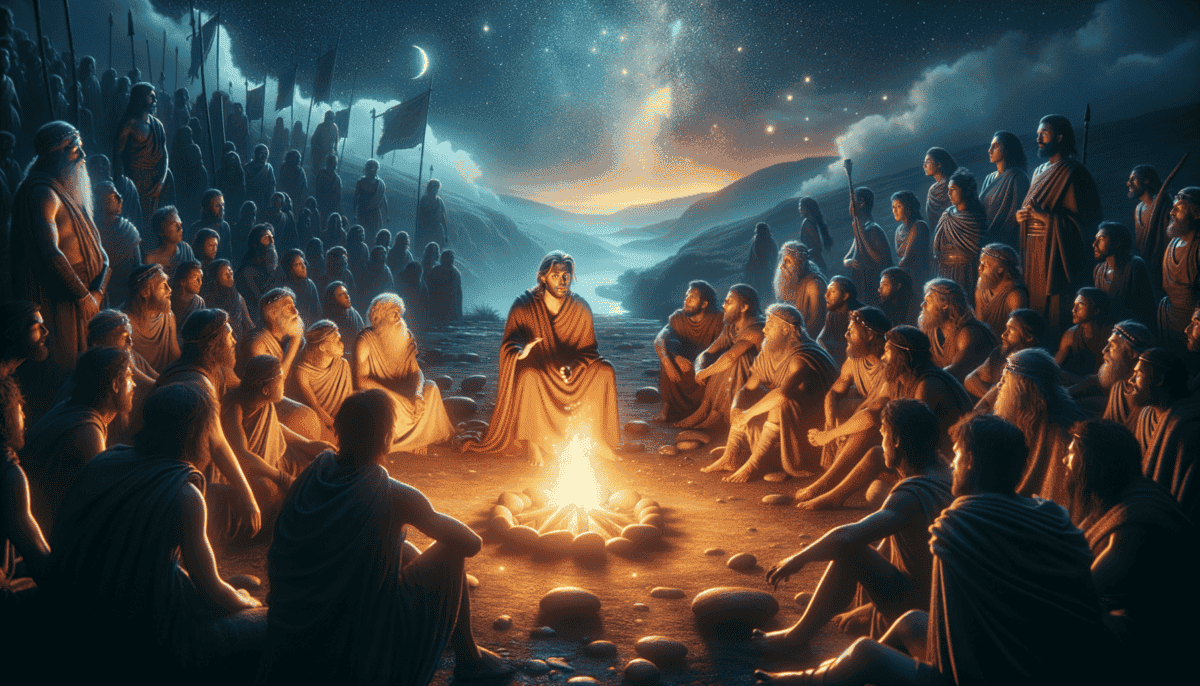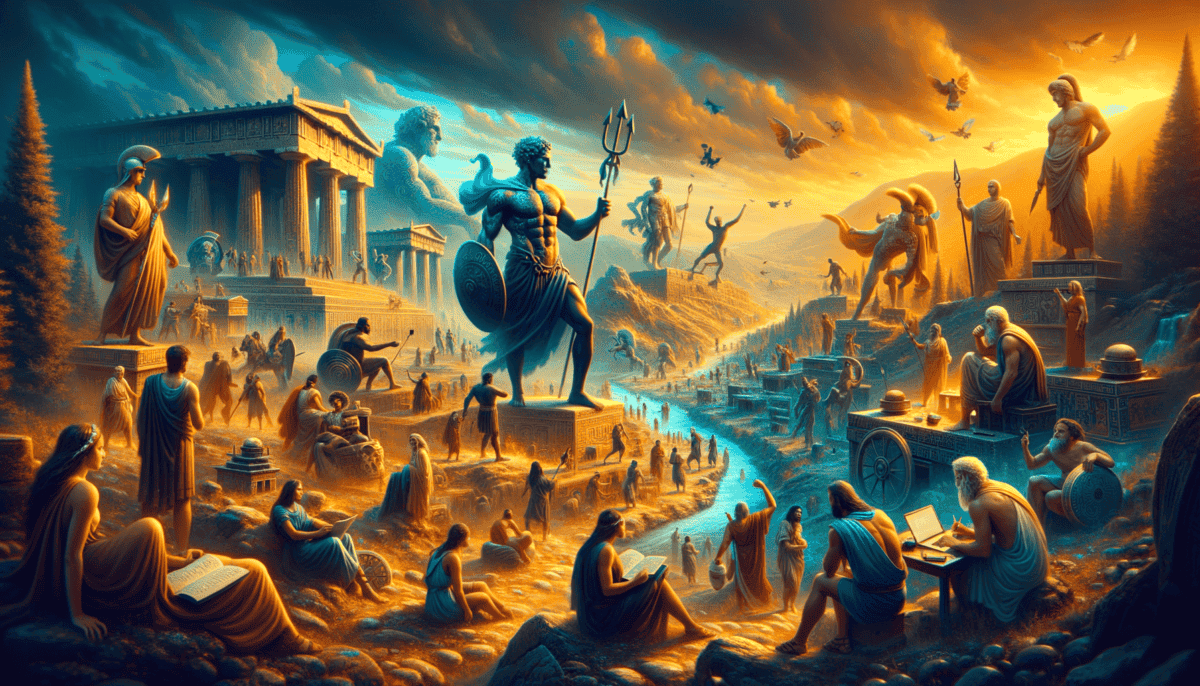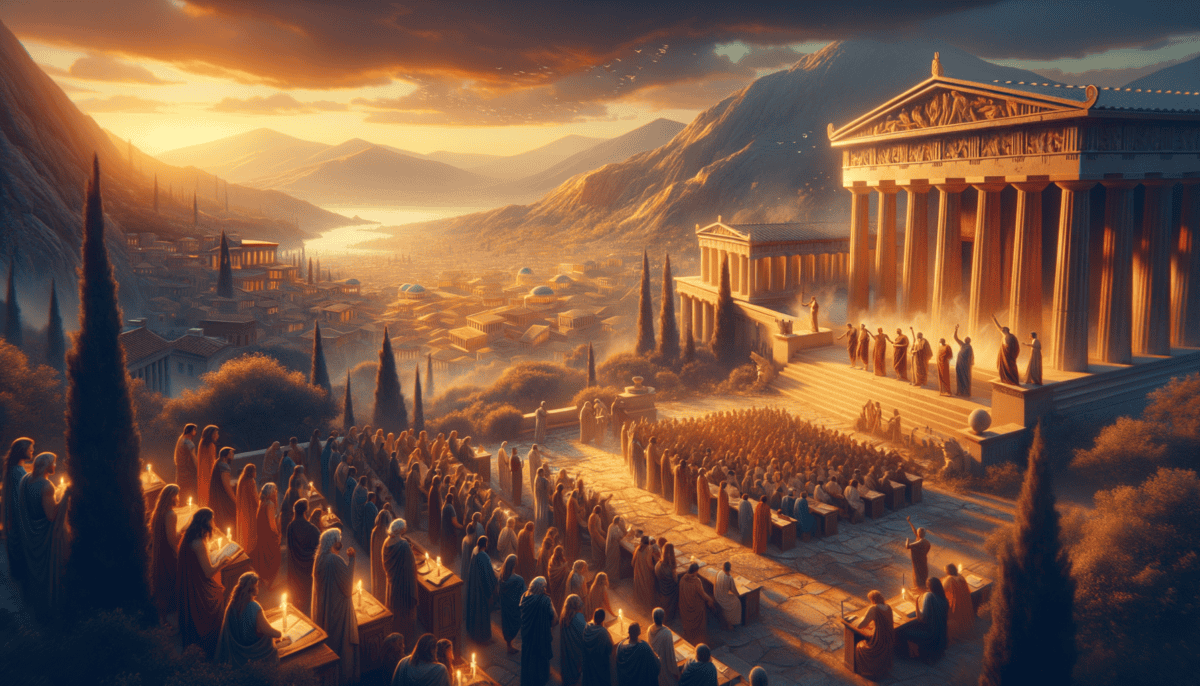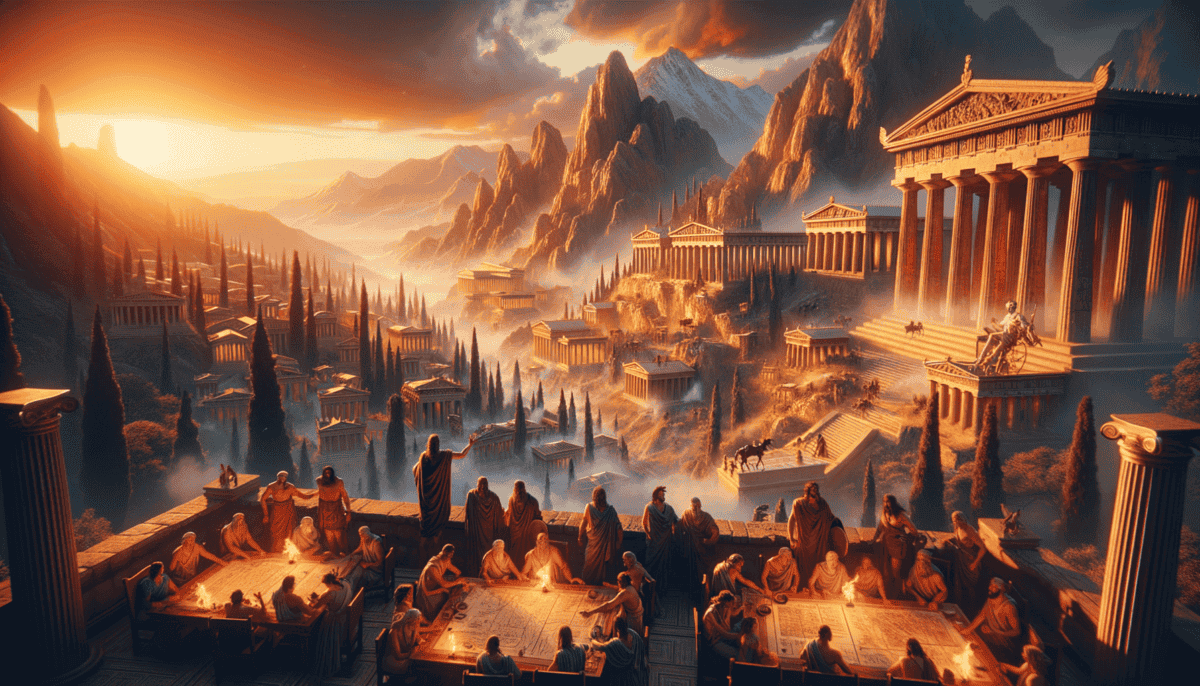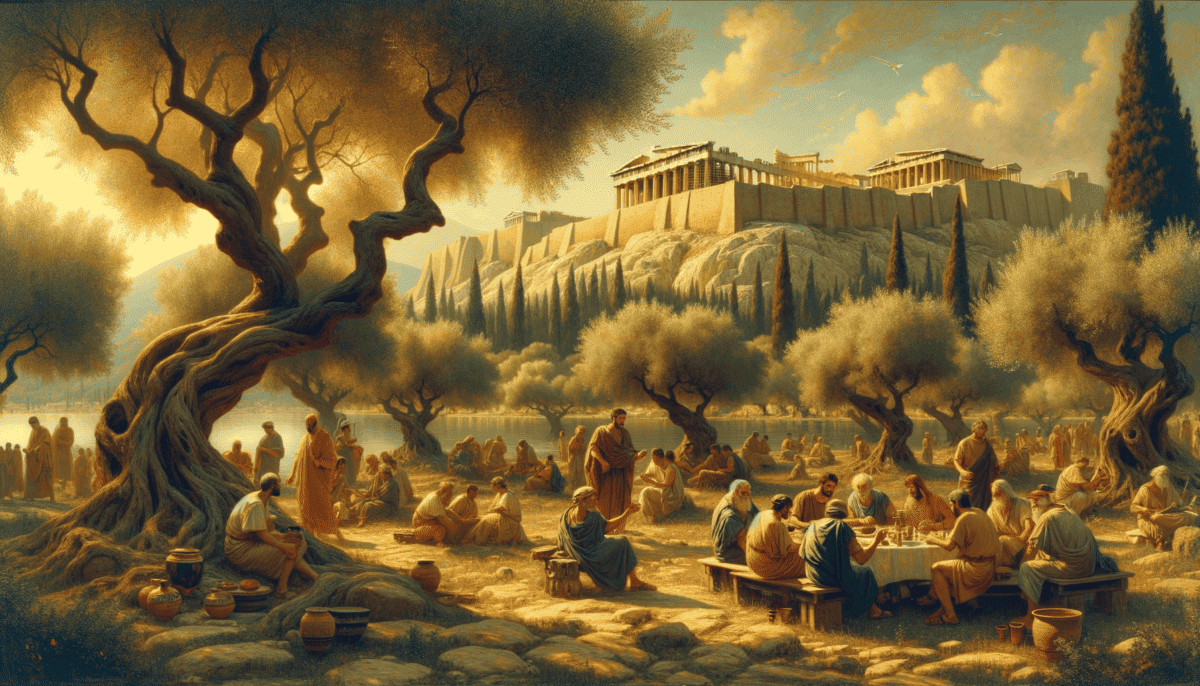Shadows of the Dark Ages
Long ago, in a land of rocky hills and deep blue seas, small groups of people lived in scattered villages across Greece. The sun beat down on the dusty ground, and life wasn't easy for these early Greeks.
"Papa, why do we live so far from other people?" young Alexandros asked his father as they walked along a narrow mountain path.
His father, Nikias, pointed to the harsh landscape around them. "Look at these mountains, my son. They split our land into many tiny pieces. That's why different families live far apart in small groups."
The rocky ground made it hard to grow food. Each family had to work together just to survive. They kept goats and sheep, which could eat the tough mountain grass. In their small gardens, they grew olives and grapes that could handle the dry weather.
Life changed with the seasons. In spring, families would plant their crops. Summer meant long days tending to animals and gardens. Fall was harvest time, when everyone worked together to gather food for winter.
"Listen," Nikias said one evening as the family gathered around the fire. "Do you hear the waves?" The sound of the sea was always there, like a gentle song in the background. The sea was their friend – it brought fish for food and ways to travel to other villages.
Working Together to Survive
Each village had a leader called a basileus. This person helped make important choices for everyone. They would decide things like:
• When to plant crops
• How to share food in hard times
• Where to build new homes
• How to protect the village from danger
Little Alexandros watched as people from nearby villages sometimes came to trade. They brought different things – maybe some honey from the forest, or clay pots they had made. His village would trade back with olive oil or wool from their sheep.
"Papa," Alexandros said one day, "why do those people look different from us?"
Nikias smiled. "We're all Greeks, son, but each village has its own way of doing things. Some are better at making pots, others at growing olives. That's why we trade – we help each other."
As the years passed, these small villages grew bigger. People learned new ways to farm and make things. They started building stronger houses with stone. Some villages became so big they turned into towns.
"Things are changing," Nikias told Alexandros, now older and stronger. "Our people are learning to work together better. Soon, we might even build a real city."
The stars twinkled above them as father and son looked out from their hillside home. In the distance, they could see the lights of other villages, like tiny stars on the ground. The time of small, scattered villages was slowly coming to an end. A new chapter in the story of Greece was about to begin.
Heroes and Stories
The flames danced in the night as young Marina sat with her friends around the fire. Old Theron, the village storyteller, cleared his throat. Everyone leaned forward eagerly.
“Tell us about Hercules again!” Marina called out, her eyes sparkling with excitement.
Theron smiled and began, “Ah, the mighty Hercules! He was the strongest hero who ever lived. His muscles were as hard as rocks, and his heart was as big as Mount Olympus!”
“Did he really fight the nine-headed monster?” little Panos asked, scooting closer to his sister Marina.
“The Hydra!” Theron nodded. “Every time Hercules cut off one of its heads, two more grew back! But Hercules was clever. He figured out that fire could stop the heads from growing.”
Learning from Legends
These stories weren’t just for fun. They taught important lessons about:
• Being brave when things are scary
• Helping others in need
• Using your brain to solve problems
• Never giving up when things get hard
“What about Theseus?” someone called from the crowd. “Tell us about how he saved Athens!”
Theron’s voice grew serious. “Ah, brave Theseus! He volunteered to face the terrible Minotaur – half man, half bull – to save his city. He went into a maze so tricky that no one had ever found their way out!”
Marina hugged her knees to her chest. “But he had help, right? From the princess?”
“Yes! Princess Ariadne gave him a ball of string. He tied one end at the entrance and unwound it as he walked. After he defeated the Minotaur, he followed the string back out. Sometimes the smartest heroes know when to accept help!”
Stories Come to Life
During the day, children would play at being heroes. They used sticks for swords and wrapped blankets around their shoulders like capes. Marina usually played Athena, the wise goddess of wisdom.
“Look!” she would say, pointing her stick-sword at the sky. “I’m protecting Athens with my shield!”
The adults smiled, knowing these games helped children learn important values. The stories were making them braver, kinder, and smarter.
As the fire died down, Theron looked at his young audience. “You know,” he said softly, “heroes aren’t just in stories. They’re people who make brave choices every day. Maybe someday, people will tell stories about you!”
That night, as Marina walked home under the stars, she imagined all the heroes who had come before her. The same stars had watched over Hercules and Theseus. Now they watched over her and her friends as they grew up, learning to be heroes in their own way.
The stories were changing too. As villages grew larger and people traveled more, they shared their tales. Each time a story was told, it grew richer, like a tapestry with new threads woven in. Greece was growing up, and its stories were growing with it.
Cities Rise from Stone
The morning sun cast long shadows over the hillside as Marina watched workers stack heavy stones. A new city wall was growing higher each day. ️
“Why are we building walls, father?” Marina asked, tugging at her father’s sleeve.
Her father, Alexandros, a respected member of the growing settlement, smiled. “We’re not just building walls, little one. We’re building a polis – a city where people can live together safely.”
Two Different Cities
“Look there,” Alexandros pointed to a map drawn in the dirt. “Athens is growing in the south, and Sparta in the mountains. They’re both strong cities, but very different.”
Marina traced the lines in the dirt. “How are they different, father?”
“Well, in Athens, people love art and learning. They talk a lot about ideas. In Sparta, they focus on being strong warriors. Both cities are finding their own way.”
• Athens: Loved poetry, art, and talking about big ideas
• Sparta: Focused on being brave warriors and following strict rules
Working Together
A group of men gathered in the city center. Marina watched as they raised their hands to vote on new rules for the marketplace.
“Why do they all get to decide?” Marina asked.
“Because this is our home, all of us together,” her father explained. “We’re learning that when people have a voice in decisions, the city grows stronger.”
New Ways of Living
As the sun climbed higher, Marina saw more city life unfold. Farmers brought olives and grapes to sell. Craftspeople shaped clay into pots. Teachers gathered children to learn about numbers and letters.
“Our city is like a big family,” she said proudly.
“Yes,” her father agreed. “And like a family, we must all do our part. Some grow food, others build houses, and some protect us. Everyone has a job to make our polis strong.”
• Follow city laws
• Help their neighbors
• Join in city meetings
• Defend their home
Growing Stronger
That evening, Marina sat on the new city wall, watching the sunset paint the buildings golden. Below, she could hear the sounds of city life – people talking, working, and laughing together.
“Will our city keep growing?” she asked her father.
“Yes, little one. And as it grows, we’ll face new challenges. But together, we’ll find ways to make our polis even better.”
As stars began to twinkle above, Marina thought about how different life was now from the stories of old heroes. People weren’t just fighting monsters anymore – they were building something new, something that would last for generations to come.
Marina yawned and leaned against her father’s shoulder. Tomorrow would bring new challenges and opportunities. But for now, she was happy to be part of this growing community, where every person’s voice mattered in shaping their shared destiny.
Voices of Change
The marketplace buzzed with excitement as people gathered around a tall man with kind eyes. His name was Solon, and he had big ideas about making Athens better for everyone. ️
“Listen!” young Theron tugged at his mother’s sleeve. “The wise man is speaking again!”
Solon’s voice carried across the crowd: “Every person in Athens should have a chance to speak and help make our city’s rules!”
New Rules for Everyone
Theron’s mother, Helena, explained to him, “Before Solon, only rich people could help make decisions. Poor farmers had to do whatever the wealthy told them.”
“That’s not fair!” Theron frowned.
“You’re right,” Helena smiled. “That’s why Solon is changing things.”
• Poor people didn’t have to be slaves anymore
• Everyone got to vote in meetings
• People could choose their jobs
• Kids had to go to school
Learning to Be Citizens
In the new school building, children sat in circles learning about being good citizens. Theron loved these lessons.
“What makes a good citizen?” asked the teacher.
“Speaking up when we see something wrong!” one student called out.
“Listening to others, even if we disagree!” added another.
Standing Up for Rights
One day, Theron saw a group of people holding pieces of broken pottery. They were writing names on them.
“What are they doing?” he asked his mother.
“It’s called ostracism,” she explained. “If someone tries to become too powerful and hurt our democracy, people can vote to send them away for ten years.” ✍️
“So even important people have to follow the rules?”
“Exactly! That’s what makes our new system special.”
Growing Together
As months passed, Theron noticed more changes. More people came to city meetings. Farmers started selling their own food instead of giving it all to rich landowners. Artists created beautiful things for everyone to enjoy.
One evening, Theron sat with his family on their rooftop, watching the sunset over Athens. The Acropolis glowed golden in the fading light.
“Mother,” he said thoughtfully, “I want to help make our city even better when I grow up.”
Helena hugged him close. “You already are, my son. Every time you speak up for what’s right, every time you listen to others, you’re helping build a stronger Athens.”
As stars appeared in the darkening sky, Theron thought about all he was learning. Being part of this new way of life was exciting. Tomorrow would bring more chances to help shape the future of his beloved city.
Heroes Unite
Dark clouds gathered over Athens as messenger runners spread urgent news: the mighty Persian army was coming! ♂️
“Father, why do the Persians want to attack us?” little Marina asked, watching soldiers march through the streets.
“They want to rule all the lands they can find,” her father Alexios explained. “But we Greeks love our freedom too much to let that happen.”
A Call for Unity
In the busy marketplace, people from different Greek cities gathered. Spartans in their red cloaks stood next to Athenian merchants. Warriors from Thebes chatted with sailors from Corinth.
“Look!” Marina pointed. “Everyone’s working together now!”
• Shared their soldiers
• Built more ships
• Made plans together
• Protected each other’s cities
The Battle at Sea
At Salamis, Greek ships waited in the narrow waters. Marina and other children helped carry water to the sailors preparing for battle.
“Our small ships can move better in tight spaces,” a captain explained to the curious children. “The big Persian ships will get stuck!” ⛵
Standing Strong at Thermopylae
Stories spread about the brave 300 Spartans who fought at Thermopylae. Though they lost that battle, their courage inspired everyone.
“Why did they stay when they knew they couldn’t win?” Marina asked.
“Sometimes being brave means fighting for what’s right, even when it’s hard,” Alexios answered. ️
Victory for All
When the Persian army finally left Greece, people celebrated in every city. Marina watched dancers spin through the streets, waving olive branches.
At the victory feast, Marina sat with children from other cities. They shared stories, laughed, and traded small gifts.
“Before, we barely knew kids from other cities,” she told her father. “Now we’re all friends!”
A New Beginning
As peace returned, the Greeks built beautiful temples to thank their gods. They wrote songs about their victories and painted pictures on pottery.
Marina helped plant an olive tree in her garden. “This tree will grow as we grow,” her father said. “It will remind us that peace and friendship make us strong.”
That night, looking at the stars, Marina felt proud to be Greek. Her people had shown that when cities join together, they can overcome any challenge.
A Time of Great Ideas
The morning sun sparkled over Athens as Marina, now a little older, walked with her father through the bustling marketplace. Things had changed since the Greeks won their freedom!
“Look, Father!” Marina pointed to a group gathered under an olive tree. “What are they doing?”
“They’re having a special talk called philosophy,” Alexios smiled. “It means ‘love of wisdom.'”
New Ways of Learning
In the city center, Marina saw children sitting in circles, learning to read and write. Before, only rich people learned these things. Now, more kids could go to school!
• Reading and writing
• Math and science
• Music and art
• How to think about big ideas
Speaking Up
Marina watched people gathering at the Pnyx hill. Here, citizens came to vote and share ideas about running the city.
“Everyone gets a chance to speak,” her father explained. “That’s what makes our democracy special.” ️
Building Beauty
Workers were building the magnificent Parthenon temple. Marina helped carry water to the tired builders.
“We’re making something that will last forever,” a sculptor told her, carving delicate shapes in marble. “When people see this, they’ll remember what Greeks can do.” ️
Sharing Stories
In the theater, Marina watched plays that made people laugh and think. Writers told stories about heroes, gods, and important choices people make.
Seeds of the Future
Marina’s olive tree had grown tall and strong, just like Greek ideas about freedom and democracy. These ideas would spread far beyond Greece.
“Our ideas are like seeds,” Alexios told Marina as they walked home. “They’ll grow wherever people plant them.”
That evening, Marina sat with friends in her garden. They talked about their dreams for the future, just like the philosophers in the marketplace.
“We learned that when people work together and share ideas, wonderful things can happen,” Marina said. “And that’s a lesson that will last forever.” ⭐
And she was right. The ideas that grew in ancient Greece – about freedom, learning, and working together – still help people all around the world today. Just as Marina’s olive tree grew strong and tall, these ideas continue to grow and inspire new generations to build better communities.


